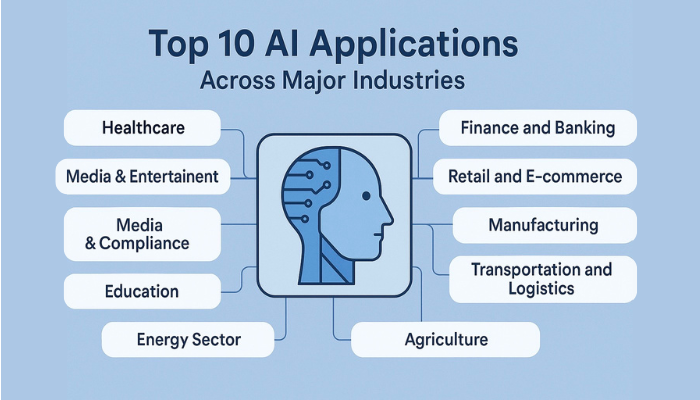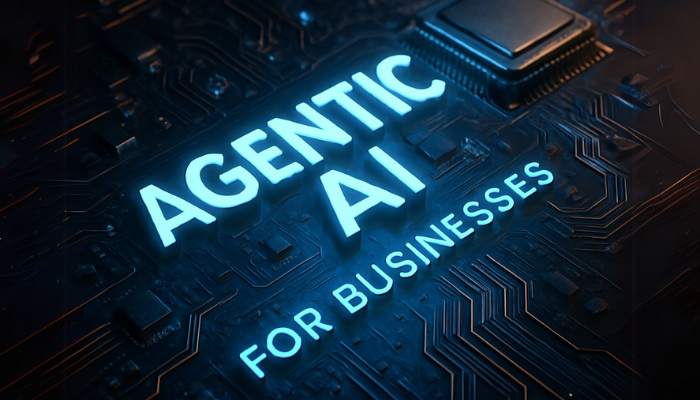As a business leader, you’re always looking for ways to stay competitive, streamline operations, and improve customer experiences. It’s no surprise that Artificial Intelligence (AI) is quickly making its mark across industries.
In fact, the AI market is expected to reach $74 billion by 2025 and keep growing at a rate of 27% annually, reaching over $309 billion by 2031. Adopting AI is crucial because it can streamline tasks, improve decision-making, and boost efficiency across various industries. Whether you’re in healthcare, finance, retail, or manufacturing, AI is changing the way businesses operate, making processes smarter and more efficient.
In this blog, we’ll explain what Artificial intelligence really means, the benefits of AI in different industries, AI applications in major industries and common challenges with solutions. We’ll also talk about what trends to look out for in the future.
What is Artificial Intelligence?
Artificial Intelligence is technology that allows machines to perform tasks that would usually require human intelligence. This includes things like learning from experience, recognizing patterns, understanding language, and making decisions. AI works by processing large amounts of data to identify patterns and then using these patterns to predict outcomes or solve problems. Instead of relying on human input for every decision, AI systems can analyze information, adapt, and improve over time.
So now that you know what AI is all about, let’s talk about its benefits across different industries.
Key Benefits of AI Across Industries
AI is changing the way businesses work in every major industry. From healthcare and finance to manufacturing and retail, AI is helping companies become more efficient, save time, and reduce costs. Here is how AI can benefit you, no matter the industry you’re in:
- Increases Efficiency
AI automates repetitive tasks, such as scheduling, data entry, and customer support. This frees up time for you and your team to focus on more important work, improving overall productivity, and delivering results faster.
- Improves Decision-Making
AI analyzes large amounts of data quickly, providing insights that help you make better business decisions. Whether it’s predicting market trends in finance or understanding customer behavior in retail, AI gives you the edge to stay ahead.
- Enhances Customer Service
AI personalizes interactions by recommending products, answering questions instantly via chatbots, and offering tailored solutions. This leads to happier customers and stronger loyalty, especially in retail, e-commerce, and hospitality.
- Cuts Costs
By automating tasks and predicting issues like equipment failures in manufacturing, AI reduces operational costs and minimizes downtime. This means more savings and a smoother operation.
- Drives Innovation
AI speeds up product development and creative processes. In sectors like healthcare and automotive, it helps design new treatments or smarter vehicles faster, giving your business a competitive advantage.
- Improves Security
AI detects fraud and security threats in real time, particularly in finance and cybersecurity. It helps protect sensitive data and respond quickly to risks, keeping your business and customers safe.
- Promotes Sustainability
AI optimizes energy use, reduces waste, and helps manage resources efficiently. This is especially useful in industries like energy, construction, and hospitality, where sustainability is becoming increasingly important.
- Boosts Teamwork
AI-powered tools help teams collaborate, share knowledge, and solve problems more effectively. This transforms workplaces by making teamwork smoother, even across different locations and departments.
Curious about AI & automation in 2025? Check out our blog, AI & Automation in 2025: New Rules of Software Development, to learn more!
Understanding the benefits is just one part of the puzzle. To truly see AI’s impact, you need to explore how it’s shaping industries from the inside out.
Top 10 AI Applications in Major Industries
AI is making a huge impact across different industries, helping you solve problems and achieve goals faster. The following are 10 major industries where AI is making a real difference. In each one, you’ll discover how it’s being applied, the benefits it brings, the challenges you may face, and the smart solutions helping to overcome those hurdles.
1. Healthcare
AI is changing the healthcare world in big ways. Whether you’re working in a hospital, clinic, or healthcare facility, AI can help improve patient care, simplify everyday tasks, and speed up medical research. With AI, you can enhance the quality of care you offer while making your operations run more smoothly.
AI Applications in Healthcare
Here are some of the ways you can use AI in healthcare:
- Predictive Diagnostics: AI can analyze medical data and predict potential health issues like cancer or heart disease, allowing for early intervention. This means you can offer more proactive care to your patients.
- Medical Imaging: AI-powered systems can interpret medical images, such as X-rays or MRIs, faster and more accurately than humans. This helps you provide faster diagnoses, which could be life-saving in urgent cases.
- Robotic Surgery: AI-assisted robotic tools offer precision during surgeries. These systems help reduce human error, enhance recovery times, and minimize complications, making procedures safer for your patients.
- Virtual Health Assistants: AI-driven chatbots or virtual assistants can help patients schedule appointments, provide medication reminders, and answer basic healthcare queries. This frees up your staff for more critical tasks.
- Drug Discovery: AI is speeding up the drug development process by analyzing large datasets to identify promising compounds faster. This can potentially save years in getting life-saving drugs to market.
Benefits of AI in Healthcare
The following are some key ways AI can help improve your healthcare services:
- Faster Diagnoses: AI helps analyze data quickly, so your team can diagnose conditions faster, reducing wait times for patients and improving outcomes.
- Cost Efficiency: By automating routine tasks like administrative work and data entry, AI helps reduce operational costs, allowing your resources to be better allocated.
- Enhanced Patient Care: With AI, you can offer personalized care plans that consider patient history and current conditions, ensuring better treatment outcomes.
2. Finance and Banking
The finance industry is using AI to automate tasks, detect fraud, and enhance decision-making. As a financial institution or business owner, AI can help you operate more efficiently, improve security, and offer personalized services to your clients.
AI Applications in Finance and Banking
Here’s how you can apply AI in your finance or banking operations:
- Fraud Detection: AI systems continuously monitor transactions for suspicious activities, helping you detect fraud in real-time before it causes significant damage.
- Algorithmic Trading: AI algorithms analyze vast amounts of market data and make automated trading decisions, potentially improving your investment strategies and returns.
- Credit Scoring: AI can assess creditworthiness by analyzing a range of data beyond traditional credit scores, like payment history and social behavior, leading to more accurate risk assessments.
- Robo-Advisors: AI-powered robo-advisors offer personalized financial advice and investment recommendations based on an individual’s goals, risk tolerance, and market trends.
- Customer Service Chatbots: AI-driven chatbots handle customer queries, process account transactions, and even resolve issues, freeing up your customer service staff to focus on more complex problems.
Benefits of AI in Finance and Banking
These are some real ways AI can help you improve and save costs in the finance space:
- Enhanced Security: AI detects unusual activity and potential fraud much faster than human teams, protecting your clients’ funds and sensitive data.
- Faster Processing: Automating processes like loan approvals or financial transactions means customers experience quicker services, leading to higher satisfaction.
- Personalized Services: AI enables you to offer tailored financial products and advice to your customers, improving customer satisfaction and loyalty.
3. Retail and E-commerce
If you’re in retail or e-commerce, AI is likely already making a difference in your business. It helps enhance customer experiences, offer personalized services, and keep inventory running smoothly. Whether you have a physical store or an online shop, AI can make your operations more efficient and boost your sales.
AI Applications in Retail and E-commerce
Here are ways you can use AI to grow your retail or online store:
- Personalized Recommendations: AI analyzes customers’ browsing and purchasing history to recommend products tailored to their preferences. This helps increase sales by offering shoppers what they’re most likely to buy.
- Inventory Management: AI tools track inventory levels in real-time and predict demand based on purchasing trends, ensuring you stock the right products at the right time.
- Chatbots and Virtual Assistants: AI-powered chatbots provide customer support, helping shoppers find products, answer questions, and solve problems instantly, improving customer satisfaction.
- Price Optimization: AI uses data on market trends, competitors, and demand to optimize pricing strategies. This allows you to stay competitive and increase your profit margins by adjusting prices based on real-time data.
- Visual Search and Recognition: AI enables visual search, allowing customers to upload images and find similar products. This enhances the online shopping experience by providing a more intuitive search method.
Benefits of AI in Retail and E-commerce
These benefits show how AI helps you create better shopping experiences and boost sales:
- Better Customer Experiences: AI personalizes shopping experiences, making it easier for customers to find products they love.
- Increased Sales: AI-driven tools like recommendation engines and dynamic pricing boost sales by targeting the right customer segments with the right offers.
- Improved Operational Efficiency: AI helps streamline inventory management and supply chain operations, reducing overstock and out-of-stock situations while optimizing warehouse operations.
- 24/7 Customer Support: With AI chatbots, you can offer round-the-clock customer service, improving customer satisfaction and reducing the burden on human support teams.
4. Manufacturing
Manufacturing is one of the most significant industries benefiting from AI. From predictive maintenance to smart factories, AI is improving productivity, reducing downtime, and optimizing supply chains. If you’re in the manufacturing business, AI can help streamline operations and drive innovation.
AI Applications in Manufacturing
These are the applications where you can use AI to improve your production process and safety:
- Predictive Maintenance: AI watches over your machinery and equipment in real-time to predict when something might break down. This helps you avoid unplanned downtime and expensive repairs.
- Supply Chain Optimization: AI helps you manage your supply chain better by predicting demand, controlling inventory, and automating procurement. This ensures a smoother and more efficient production flow.
- Quality Control: AI-powered vision systems inspect your products for defects faster and more accurately than human inspectors. This improves product quality and reduces waste.
- Robotic Process Automation (RPA): AI-driven robots can take care of repetitive tasks like assembly, packing, and sorting. This boosts operational efficiency and helps cut down on labor costs.
- Smart Manufacturing Systems: AI optimizes your entire manufacturing process, from planning to production to delivery. It adjusts operations in real-time to help your factory run more efficiently.
Benefits of AI in Manufacturing
AI brings these strong advantages to your factory or manufacturing site:
- Reduced Downtime: AI helps predict equipment failures before they happen, ensuring machines stay operational and minimizing costly downtime.
- Improved Quality: AI ensures more consistent and accurate production with less human error, leading to higher-quality products and fewer defects.
5. Transportation and Logistics
The transportation and logistics industry is increasingly dependent on AI to improve efficiency, reduce costs, and ensure timely deliveries. From autonomous vehicles to route optimization, AI is changing how goods are transported across the globe.
AI Applications in Transportation and Logistics
Here’s how you can use AI to make your delivery and transport systems smarter:
- Route Optimization: AI analyzes traffic patterns, weather, and delivery schedules to find the best routes for your drivers. This reduces fuel costs, delivery times, and operational costs.
- Autonomous Vehicles: Self-driving trucks and drones are changing how goods are delivered. These vehicles reduce the need for human drivers, speed up deliveries, and cut labor costs.
- Predictive Maintenance: AI systems monitor your vehicles’ health and predict when maintenance is needed. This helps prevent breakdowns and unexpected downtime, keeping your vehicles running smoothly.
- Supply Chain Management: AI makes it easier to manage inventory and forecast demand, ensuring that your goods are delivered on time and reducing disruptions in your supply chain.
- Fleet Management: AI tools help you manage your fleet more efficiently by tracking vehicle locations, performance, and maintenance in real-time. This helps you make smarter, data-driven decisions.
Benefits of AI in Transportation and Logistics
These benefits help you speed up deliveries and reduce costs:
- Improved Delivery Times: AI helps improve on-time delivery rates by predicting the best routes, tracking packages in real-time, and adjusting for delays.
- Enhanced Safety: AI-powered systems in autonomous vehicles improve safety by eliminating human error and using sensors to avoid accidents and road hazards.
- Increased Efficiency: Automation of routine tasks, like monitoring vehicle health and optimizing routes, frees up human workers for more complex tasks, boosting overall productivity.
6. Agriculture
If you’re in agriculture, AI is transforming the way you work. AI technologies are helping you monitor crop health, automate tasks, and make data-driven decisions to boost your production while minimizing environmental impact.
AI Applications in Agriculture
These AI applications can help you improve farming, from planting to harvest:
- Precision Farming: AI uses data from sensors and drones to monitor your soil health, water levels, and crop conditions. This helps you make precise adjustments and improve your crop yields.
- Automated Harvesting: AI-powered robots and drones can help harvest crops more efficiently, reducing labor costs and speeding up the process.
- Predictive Analytics: AI predicts crop diseases, pest infestations, and weather patterns. With this information, you can take preventive actions to protect your crops before problems arise.
- Livestock Monitoring: AI tools can track the health, behavior, and growth of your livestock in real-time. This lets you spot issues early and optimize the welfare of your animals.
- Supply Chain Optimization: AI helps track your crops from farm to market, improving logistics, reducing waste, and predicting demand to make your supply chain more efficient.
Benefits of AI in Agriculture
The following benefits show how AI makes your farming more accurate and cost-effective:
- Increased Yields: AI helps you monitor and adjust your farming methods, so you can manage crops better and grow more.
- Reduced Waste: With real-time data on crop health, water use, and harvest timing, AI helps you use your resources wisely and cut down on waste.
- Improved Crop Health: AI spots early signs of disease, pests, or lack of nutrients. This lets you fix problems early before they spread and hurt your crops.
7. Education
The education sector is changing, and AI is playing a central role in reshaping how students learn and how educators teach. With AI, you can provide personalized learning experiences, streamline administrative tasks, and engage students in more interactive ways.
AI Applications in Education
Here’s how AI supports you as a teacher and helps your students learn better:
- Personalized Learning: AI helps you create lessons that fit each student’s needs. This way, students can learn at their own pace and get better results.
- Intelligent Tutoring Systems: You can use AI tutors to give students instant, personalized help. These systems explain topics clearly and guide students when they get stuck.
- Automated Grading: AI takes care of grading tests and assignments, saving you time. You can then focus more on planning lessons and helping your students grow.
- Virtual Classrooms: AI supports online learning by creating interactive and fun virtual classes. Your students can join from anywhere and stay engaged.
- AI-Driven Analytics: AI reviews student performance and shows you where they need help. This helps you improve lessons and boost student success.
Benefits of AI in Education
These benefits explain how AI improves learning and classroom management:
- Personalized Education: You can give each student a learning plan that fits their style and pace. This helps them stay focused and do better in school.
- Increased Accessibility: With tools like speech-to-text and translation, you can support students with disabilities or those who speak different languages.
- Efficient Administration: AI can handle tasks like grading and scheduling, so you spend less time on paperwork and more time teaching.
8. Energy Sector
In the energy sector, AI is becoming a powerful tool to help you work smarter. It supports everything from improving how energy is produced to making sure less is wasted. Whether you’re handling renewable sources like solar or wind, or managing electricity across a power grid, AI helps you make faster, better decisions every day.
AI Applications in the Energy Sector
Here are the ways AI helps you manage energy use, production, and forecasting:
- Smart Grid Management: AI helps you manage how electricity is shared across the grid. It makes sure energy is used efficiently and lowers the chance of power cuts.
- Predictive Maintenance: AI tools can warn you when equipment might break down. This lets you fix things early and avoid costly repairs or downtime.
- Energy Consumption Forecasting: AI looks at your data to predict how much energy will be needed. This helps you plan better and avoid wasting energy.
- Renewable Energy Optimization: If you’re using solar or wind energy, AI helps by predicting the weather and adjusting your system to get the best results.
- Energy Storage Optimization: AI helps you decide the best times to store or release energy. This makes your storage systems more useful and saves energy.
Benefits of AI in the Energy Sector
These are key benefits that show how AI helps you save energy and cut costs:
- Fewer Breakdowns: AI can tell you when something might break. You can fix it early and avoid shutdowns or delays.
- Cleaner Energy: AI helps you get the most from solar, wind, and other clean energy. This means less pollution and better use of natural resources.
9. Legal and Compliance
The legal and compliance industry faces ongoing pressure to stay accurate, fast, and transparent. AI is changing the way legal professionals handle tasks like document review, contract analysis, and compliance monitoring. With AI, you can simplify your work, reduce mistakes, and easily stay on top of regulatory standards.
AI Applications in Legal and Compliance
Below are some key applications of AI in legal and compliance:
- Document Review Automation: AI tools can quickly scan and analyze vast amounts of legal documents, making document review faster and more accurate.
- Contract Analytics: AI-powered software can extract key clauses, terms, and conditions from contracts, helping legal teams identify risks and opportunities efficiently.
- Legal Research: AI helps you conduct legal research by quickly sifting through case law, statutes, and regulations to find relevant precedents, saving time and effort.
- Compliance Monitoring: AI tools track changes in regulations and alert you to potential compliance issues, helping you avoid penalties and legal risks.
- Predictive Analytics for Litigation: AI analyzes past case data to predict the likely outcome of ongoing litigation, providing valuable insights to help you make informed decisions.
Benefits of AI in Legal and Compliance
Here’s how AI helps you save time and reduce mistakes in legal tasks:
- Improved Accuracy: AI minimizes human error by analyzing large datasets and identifying patterns that may be missed by humans, improving the overall quality of work.
- Faster Decision-Making: With AI’s ability to process vast amounts of data in seconds, you can make quicker and more informed legal decisions, improving overall operational speed.
- Better Compliance Management: AI tools help you stay up-to-date with regulatory changes and flag potential compliance issues before they escalate, ensuring you meet legal obligations without delay.
10. Media & Entertainment
In the media and entertainment world, creativity and keeping your audience engaged are key. AI is helping to make things easier by automating content creation, improving customer experiences, and making production smoother.
AI Applications in Media & Entertainment
Here’s how you can use AI to create content and engage your audience better:
- Content Personalization: AI looks at what your audience likes and suggests content based on their preferences, keeping them engaged and coming back for more.
- Automated Video Editing: AI can automatically choose the best scenes, add transitions, and even help with scriptwriting, saving you time during the editing process.
- Natural Language Processing (NLP) for Subtitles and Translations: AI generates accurate subtitles and translations for your content, making it available to a global audience.
- Content Moderation: AI can detect inappropriate or harmful content, helping you ensure your platform stays safe and meets regulations.
- Audience Sentiment Analysis: AI analyzes social media, reviews, and other online feedback to understand how your audience feels, helping you create content that connects with them.
Benefits of AI in Media & Entertainment
These benefits help you deliver more personal and faster experiences:
- Enhanced User Experience: AI allows you to provide personalized content recommendations, which enhances the user experience and increases engagement.
- Better Content Strategy: By analyzing audience preferences and trends, AI helps you create content that resonates with your target audience, improving the effectiveness of your content strategy.
- Real-Time Content Monitoring: AI-driven content moderation tools can instantly flag harmful content, reducing the risk of legal issues and ensuring a safe platform for users.
Looking for the latest AI tools and use cases? Check out our AI Software Tools and Use Cases in 2025 blog to stay ahead of the curve!
Once you understand how industries are using AI right now, it is important to explore the challenges of AI applications across major industries.
Challenges of AI Applications Across Major Industries with Solutions
AI is transforming industries across the globe, but it also brings its own set of challenges. Here is a look at some of the key hurdles you may face when implementing AI in different sectors, along with solutions to overcome them.
1. Data Privacy and Security
AI systems need a lot of data to work well. In fields like healthcare and finance, this data often includes personal or sensitive information. People worry about their private data being stolen or misused.
Solution: You can protect sensitive data by using strong encryption and following strict privacy laws, such as HIPAA for healthcare or GDPR for general data protection. Regular security checks and audits also help keep information safe from hackers.
2. Algorithmic Bias and Ethics
AI can sometimes make unfair decisions. For example, if an AI hiring tool is trained on biased data, it might favor one group over another. This can happen in banking, hiring, or even healthcare.
Solution: To avoid this, always test your AI systems for bias. Use data from diverse sources and set up clear ethical rules for how AI should be used. This helps ensure everyone is treated fairly.
3. Lack of Skilled Talent
AI technology is new for many companies, and there aren’t enough experts to build and manage these systems. This is a big problem in industries like manufacturing and logistics.
Solution: You can solve this by training your current employees in AI skills or working with local colleges and tech schools. There are also easy-to-use AI tools that don’t require advanced skills, so your team can get started faster.
4. Integration with Legacy Systems
Many companies still use old technology. Connecting new AI tools with these outdated systems can be tricky and expensive.
Solution: You can use special software (APIs and middleware) to help new and old systems talk to each other. It’s also smart to roll out AI in small steps, so you don’t disrupt your whole business at once.
5. Regulatory and Compliance Issues
Every industry has its own rules about how data and technology should be used. These rules can change from state to state or country to country, making it hard to use AI everywhere.
Solution: Stay up to date on the latest laws and work with legal experts who understand your industry. Build your AI systems to be flexible, so they can adapt to new regulations as they come.
6. High Implementation Costs
Setting up AI systems can be expensive, especially for small businesses. Costs include software, hardware, and hiring experts.
Solution: Start with small projects that can quickly show value. Use cloud-based AI services, which are cheaper and easier to scale. Look for grants or partnerships that can help cover some of the costs.
7. Workforce Resistance and Job Displacement
Employees might worry that AI will take their jobs or make their work harder. This is common in manufacturing, retail, and even offices.
Solution: Talk openly with your team about how AI can make their jobs easier, not replace them. Offer training so employees can learn new skills and be part of the AI journey.
8. Data Quality and Availability
AI is only as good as the data you give it. If your data is messy or incomplete, your AI system might make bad decisions. This is a big issue in banking and healthcare.
Solution: Set up good data management practices. Use tools to clean and organize your data before feeding it into AI systems. This way, your AI will give you better, more reliable results.
Now that you understand the challenges of AI in different industries, let’s explore the future trends that will shape AI applications in the years to come.
Future Trends in AI Applications
AI technology is constantly growing, and its role in different industries will keep growing. Here is a look at some of the key trends in AI that are expected to shape the future across various fields.
- More Human-Like AI
AI will get better at understanding and reasoning, making it more useful for your personal and business needs. With improvements in things like natural language processing and coding, AI will start to think and act more like a human, offering more reliable help.
- Autonomous AI Agents
AI-powered agents will do more than simple tasks. They’ll handle complex jobs like managing your schedule, answering questions, and even making decisions on your behalf, helping you streamline both personal and work tasks.
- Hyper-Personalization
AI will use more data to give you highly personalized experiences. Whether you’re shopping, watching content, or using financial services, AI will customize recommendations to your preferences, making your experiences more enjoyable and improving your satisfaction.
- Generative AI for Creativity and Innovation
AI will transform how you create content. From writing and design to video editing and software development, AI will automate the creative process, boosting productivity and allowing you to innovate more quickly.
- Enhanced Automation and Robotics
AI-powered robots will take over repetitive and complex tasks, especially in fields like manufacturing, logistics, and healthcare. This will help you save time, reduce costs, and improve efficiency.
- Focus on Ethical AI and Governance
As AI grows, there will be a bigger push for ethical standards and transparency. Companies will ensure that AI benefits everyone by addressing concerns like bias, privacy, and fairness, which will build trust and improve the way you use AI.
- Improved Security and Fraud Detection
AI will help protect your data by identifying cybersecurity threats and preventing fraud in real-time. This will make your digital environment safer and more secure from emerging risks.
- Multimodal and Integrated AI Systems
Future AI will combine data from text, images, videos, and more to give you richer insights and smarter solutions. This will improve applications in healthcare, public services, and entertainment, benefiting your daily life.
With these trends shaping the future, Codewave can be the partner you need to stay ahead of the curve.
Why is Codewave Your Perfect AI Partner in Major Industries?
At Codewave, we know every industry faces its own challenges. That’s why we create custom AI tools made just for your business, whether you need to automate tasks, improve customer experiences, or increase sales. Our solutions work seamlessly with your existing systems, making the transition smooth and easy. Explore Codewave’s portfolio to see how we’ve used AI to solve real-world problems across industries with smart, practical solutions.
We focus on getting real results that improve efficiency, engage customers, and grow revenue. And as your business grows, our AI solutions grow with you, so you’re always ready for what comes next. Here is how we can help in key industries:
- AI in Healthcare
In healthcare, we build AI systems that support diagnostics, scheduling, and patient monitoring. These tools help healthcare providers make more accurate diagnoses, manage appointments better, and track patient health, leading to better care and more efficient healthcare delivery.
- AI in Retail
For retail businesses, we create personalized shopping assistants and dynamic pricing tools. These AI solutions help you offer a more personalized shopping experience, adjust prices based on demand, and manage your inventory more effectively, boosting both sales and customer satisfaction.
- AI in Finance
In finance, we help you stay ahead with fraud detection, trading algorithms, and smart financial advisors. These AI tools not only keep your business safe from fraud but also help you make better investment decisions and provide personalized financial advice to your clients.
- AI in Education
For the education sector, Codewave designs personalized learning assistants and automated grading systems. These AI tools make learning more tailored to each student’s needs and help teachers save time on grading, allowing them to focus more on teaching and improving student outcomes.
- AI in Customer Service
In customer service, we build 24/7 chatbots and intelligent routing systems that make it easier to assist your customers. These AI tools help provide quick, accurate responses and ensure that customer inquiries are routed to the right team members, enhancing your service and customer satisfaction.
- AI in Energy
In the energy sector, Codewave uses AI to help businesses optimize energy use and manage smart grids. Our tools predict energy demand, reduce waste, and help distribute energy efficiently, ensuring smoother operations and cost savings for your business.
Let’s bring your business into the future with AI! Book a Demo with Codewave and see how our customized solutions can help you succeed.
Codewave is a UX first design thinking & digital transformation services company, designing & engineering innovative mobile apps, cloud, & edge solutions.







